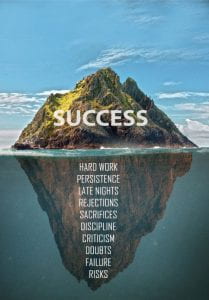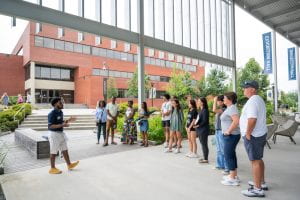Thursday, February 22
Atlanta, GA : 5 a.m.
My vibrating watch alarm went off. After 20 years of marriage, I’ve learned the hard way not to set an audible alarm before 6 a.m. (actually, that only took me about two weeks). Groggily, I drug myself downstairs and fed the cat — which is better than feeding myself and drugging the cat, I suppose. (My daughter wanted to name her using a feline pun and my son wanted a “tough sounding” name. Ultimately, we arrived at Pawly. Technically, it is Muhammad “Pawly” Clark.)
As I’m putting on my running shoes, Pawly rolled over to be petted. Immediately, recognizing my disinterested and half-hearted effort, she looked at me in disgust (yes, cats can absolutely do that), and walked away slowly, as if to say, “Loser.”
After a few head-clearing miles, I jumped in the shower, grabbed a banana and a cup of coffee, and headed to the airport. Because I make this drive regularly, I did not need or use WAZE or Google Maps.
Atlanta Airport: 7 a.m.
I pulled up my boarding pass from the Delta App and noticed that my phone was showing a “SOS message” in the top right corner. (Note: SOS is an international distress signal: the ship is going down; we are in imminent danger; send help immediately.)
At this point, I’m convinced it’s a “me problem.” I turned the phone off and back on again. No dice. Still SOS.  A flurry of explanations went through my head:
A flurry of explanations went through my head:
- Maybe Tech’s not paying for this phone any longer in my new role.
- Maybe the lint in my pocket finally won.
- My daughter. I mean…you never know.
Once I boarded the plane, however, I heard other passengers talking about the various phone carriers who were experiencing national outages. While it was moderately relieving, it did not fix the problem.
Richmond, VA: 10:15 a.m.
I rent a car and pull up to the exit booth.
“Ummm…. do you have a map?”
“No, Sweetie. Where are you going?”
“Charlottesville.”
“Ok. Go to the third light, take a left, and follow signs for 64W.”
Got it.
My realization that I had no idea how to find my hotel increased as the distance to Charlottesville decreased, but with the names of both the street and hotel, I figured I might get lucky and see one or the other on a highway sign.
Nope.
So, I randomly picked one of the four Charlottesville exits. I figured I’d give it five minutes and if I didn’t stumble on them, I’d stop and ask for help. Call it divine intervention or dumb luck, but at the second light I saw my hotel. Boom!
Charlottesville, VA: 11:45 a.m.
Grabbing my bag from the trunk I began wondering how someone who had never lived in an Alexa-less, GPS-less, wireless world would have dealt with navigating the journey I’d just made.
Well, friends, I found out upon entering the lobby, because in an absolute puddle on the coach was a 20-ish-year-old (lots of hyphens there, I know) girl crying hysterically.
“Can I borrow your phone?” she stammered.
“Ummm…well, unfortunately, I don’t have any service right now– why don’t you ask at the front desk?”
Apparently, she had not considered that option, so we went up together.
I watched her search her contacts and call her mom from the lobby land line.
Still crying softly, “Mom. I’m trying to get home…”
She grabbed a pen and scribbled down directions. In the end, she lived about 5 miles away (How do I know? Oh, I was totally looking over her shoulder– I may not pet cats at 5 a.m., but I match their curiosity 24-7).
My head: Noon
So many questions and thoughts.
- Was this really an emergency?
- Who is responsible? (You know- because nothing solves problems like pointing fingers.)
- What is the path forward?
- How does this translate to college and college admission? (Naturally)
Admissions SOS
Over the years, I have asked audiences from Atlanta to Argentina (actually, now in all hemispheres) to give me the first word they think of when they hear: “College Admission.” The number one answer on the board, and the response you’ll get most audibly and consistently, is “stress.” SOS!
I’ve gotten many other interesting ones too: Hunger Games, black box, and most recently—divorce. Wow! Dark thoughts, people. Seriously, seriously dark. Sounds like the ship is going down and we need help immediately!
And while I had no tangible solutions to remedy the AT&T outage on February 22– other than asking if someone had tried turning it off and back on again—I do have some thoughts and insight to share about alleviating stress in college admission. For a more exhaustive exploratory, feel free to buy my book or check out our 8 years archived blogs. For the Executive Summary—read on.
Question #1: Is this really an emergency?
Answer: No. (Well, that was easy.)
As my friend and colleague Katie Mattli says, “Nobody died in college admission today.” SOS is way overstated. Hunger Games? Really? And I don’t even know what to say about the divorce answer.
Question #2 and #3: Who is responsible? What is the path forward? I’m going to knock those out together here by offering three solutions for both users (students and parents) and providers (colleges).
Students
- Your list doesn’t have to be balanced. What?!! You’ll hear a lot of people say you should apply to a “balanced list of schools.” What they mean is to identify a few schools you will likely be admitted to, a few where it is less predictable, and at least one that is highly unpredictable.
No, you don’t. The average admit rate for four-year colleges is around 65%. If the places you are excited about and make sense for you each have admit rates above that– well… you are above average. Who said schools with lower admit rates are better, or should be more desirable for you? Conversely, if you apply to 10 schools that each have a 10% admit rate, it does not give you a 100% chance of getting in. Admission math does not always work the same way regular math does— but in this case… yea. Commit to not applying anywhere you would not actually go AND be sure several (or all) are “predictable” in their admission and affordability outcome. Are we getting reception back yet?
2. How > Where. I heard a Georgia Tech graduate give a keynote speech last night. In it she said, “No college can make you great. You are already great. Pick a place where you will be surrounded by classmates, professors, and opportunities that will bring that out in you.” Spoiler Alert: There are hundreds (not 25 or 50) of schools in America where that can and will happen for you. Your success, happiness, and fulfillment are far more connected to how you show up in college, rather than where. Until you believe that, it won’t matter how many times you turn your phone off and on — the SOS won’t go away. 
3. Do Your Own Homework. The girl in the lobby in Charlottesville had clearly just been following Google Maps her entire life without looking around, paying attention, or thinking for herself. Too many smart high school students approach their college search this way. And then stress comes when they “do everything right” and it still doesn’t work out the way they thought was promised. Re-routes, speed bumps, and delays are inevitable. Expect divergences and you won’t end up crying on the couch—ohhh… and that applies not just to college admission but life well beyond.
Parents
- Parents of high school students should talk to fewer parents of other high school students about college admission, and more parents of current college students or recent college grads. Why? Because parents of other high school students lie. They do. They exaggerate and fabricate. Suddenly, their daughter’s 1340 magically becomes a 1430.
“Did you hear nobody from our high school got in to X College last year?! (Beware the interrobang) And I heard that four kids from (the school down the road) got admitted with scholarships.”
Ever wonder why it’s always easier to get in from “the school down the road?” Again, because people make stuff up to fit their narrative, aka THEY LIE. They drive up the stress by speculating, pulling threads of truth and portions of stories and re-telling them inaccurately.
You know what parents of current college students or recent college grads never say in reflecting back on their experience: “I wish we’d stressed more. Yea, if I had it to over again, I’d definitely bite my nails more, drink excessively, and lose sleep worrying. Now that would have helped and made things better.”
2. Money Talks. The biggest gift you can give your student is not an open checkbook—it is an open and early conversation (10th and 11th grades) about what you can afford or are willing to pay when it comes to college. This is going to require going into detail on your rationale and allowing your student to ask questions. The bottom line is we don’t give our kids enough credit when it comes to these kinds of discussions. Wait until senior year or after your student has applied or been admitted to talk about money and you’ll only have yourself to blame for the SOS communication blackout that follows. 
3. Success Lists > College Lists. Once your family begins talking about college in earnest (typically junior year), I suggest you write down 5- 10 schools you hope they’ll consider, visit, or potentially apply to—and then next to each school name write 2-3 sentences explaining why. (Note: Because I wish I’d gone there and am vicariously living through you… red flag).
Then have them do the same and have a “curiosity conversation”—a discussion centered on trying to better understand everyone’s goals, hopes/fears, interests– and how that connect with reality.
But the more important Top 10 list you can create is one of your family members, friends, colleagues, and neighbors who have taken a variety of paths to success and happiness. Ultimately, our job as parents is to instill confidence in our kids, so that no matter where they end up, they are prepared and ready to capitalize on that opportunity (unlike the confidence and preparation displayed in the lobby in Charlottesville). We are coaches in perspective! Don’t get sucked into the tunnel vision, paranoia, and zero sum thinking that breeds anxiety. True success for our kids is making sure they have options and choices. Don’t get it twisted.
Bonus: If you read an article or social media post that features a college(s) with a first-year class size smaller than your local public high school or place of worship, it is not a trend but an outlier. Journalists know that clicks and eyeballs pop when they cite certain schools, which are frequently diminutive outposts, rather than large signposts for the direction or state of enrollment or higher education. Consider contacting the reporter and asking them to change their title to “lower education reporter.”
Note: I was going to try to work in something about a drinking game with Ivy League school mentions but thought broaching cirrhosis may detract from my larger points.
Now that we have talked about how the “users” can tamp down stress. How about “the providers?”
Colleges and colleagues.
- Data disaggregation and transparency.
Colleges should make it clear and easy to find admit rates based on each application plan; Early Action (EA), Early Decision (ED), Regular Decision (RD), and any other iterations, derivations, or acronyms. How do these vary by residency if it is a public school? What has this looked like in recent years, i.e. trends and patterns? Stress often comes from an absence of clarity.
If the college is test optional school, what is the admit rate for submitters vs. non-submitters? What raw number and percentage of students who applied with and without testing? Are there other academic ranges you can provide, i.e. GPA, number of AP/IB/Dual Enrollment courses for each cohort in isolation and comparison?
Then break that down for the enrolling class and the admitted class.
2. Eliminate weekend and holiday application deadlines. I mean…do I really need to explain why this would reduce anxiety and stress? C’mon, people. Do the right thing here. This one is easy.
3. Provide multiple mediums for conveying voice.
Ask most admission counselors what they are looking for in an application essay and you will get some version of: “We just want to hear the student’s voice.” Well, let’s solve for that. The truth is that many of these essays are already overly sanitized, AI generated, professionally tailored or tampered with, or a combination of all of the above. And it is the part of the application most students cite as the most stress-inducing.
Allowing for voice-recorded responses, or short video clips, is the student’s voice, and it is a comfortable medium that could add value and diminish anxiety. Changing the medium of delivery to audio or video – or at least providing either as an option – gives a much better sense of how a student would engage in the classroom or on campus than does the essay. Importantly, if these were limited to a minute or so, it would not add time to review for colleges – and could be a welcome reprieve for the tired eyes of admission readers. Companies such as Initial View are offering this for students, and it is time for the the Common application and Coalition application to modernize their platforms and integrate technology that allows us to more directly hear and/or see students, and the adults who support them.
I am way, way over our normal 1000-word blog goal, so if you are still with me—Congratulations!
At the end of the day, the way we tamp down stress in college admission is by keeping the end in mind: College admission leads to college. And college is about fun, friends, discovery, learning, testing assumptions, growing, and finding your own path to happiness, fulfillment, and your unique future.
Again, I’d quote our keynote speaker from Tech—you are great! You are going to be great! And you do not need cell reception or a certain bumper sticker to confirm that, because it is already in you. Surround yourself with friends, classmates, and adults who keep helping you bring that greatness out. You got this!
 Many college and university presidents are actively thinking of ways to recruit you to their campus. That’s the very reason some colleges and universities have staff dedicated to transfer students. Institutions with dedicated transfer staff place considerable importance on transfer students.
Many college and university presidents are actively thinking of ways to recruit you to their campus. That’s the very reason some colleges and universities have staff dedicated to transfer students. Institutions with dedicated transfer staff place considerable importance on transfer students.  Do not be afraid to reach out to institutions of interest. Attend a Transfer Information Session to learn more about the institution and application requirements and get valuable insight into their review process. Many times counselors will highlight beneficial tools like accessing the school’s transfer equivalency tool and opportunities to connect with faculty and current students in your desired major.
Do not be afraid to reach out to institutions of interest. Attend a Transfer Information Session to learn more about the institution and application requirements and get valuable insight into their review process. Many times counselors will highlight beneficial tools like accessing the school’s transfer equivalency tool and opportunities to connect with faculty and current students in your desired major.  LaSean Price has supported transfer students in many roles throughout her time in higher education. She joined Georgia Tech in 2019 and currently coordinates Tech’s Transfer Pathway Programs and leads admission staff in file review of transfer applicants. Having experienced the transfer process firsthand, she demonstrates a strong commitment to advocating for, supporting, and collaborating with transfer champions across campus.
LaSean Price has supported transfer students in many roles throughout her time in higher education. She joined Georgia Tech in 2019 and currently coordinates Tech’s Transfer Pathway Programs and leads admission staff in file review of transfer applicants. Having experienced the transfer process firsthand, she demonstrates a strong commitment to advocating for, supporting, and collaborating with transfer champions across campus.



 Campus tour guides are only one person and they share generally about most programs on their campus. Your tour guide is going to share information about the overall student experience on their campus, and many times their experiences are going to be similar to other majors.
Campus tour guides are only one person and they share generally about most programs on their campus. Your tour guide is going to share information about the overall student experience on their campus, and many times their experiences are going to be similar to other majors.
 Andrew Cohen joined Georgia Tech in 2018 and currently oversees the guest experience for all Undergraduate Admission visitors. His love for providing visitors with informative, authentic, and personal experiences started as a student tour guide at his alma mater, Ithaca College. Andrew’s passion for the visit experience has led him to his involvement in the Collegiate Information and Visitor Services Association, where he currently services as the President-Elect on their executive board.
Andrew Cohen joined Georgia Tech in 2018 and currently oversees the guest experience for all Undergraduate Admission visitors. His love for providing visitors with informative, authentic, and personal experiences started as a student tour guide at his alma mater, Ithaca College. Andrew’s passion for the visit experience has led him to his involvement in the Collegiate Information and Visitor Services Association, where he currently services as the President-Elect on their executive board.


